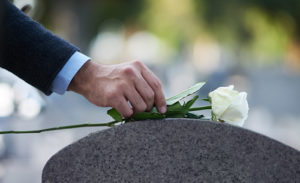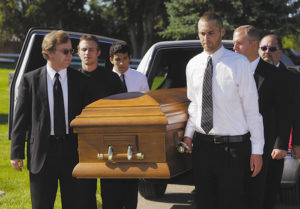By Johnnie C. Godwin
Contributing columnist, B&R
Editor’s note: The following column is Part II of a two-part series. The first part was printed in the March 24 issue of the B&R.
 In a movie on the apostle Paul, I saw Paul in prison before his martyrdom. Dr. Luke was with Paul but not imprisoned: Luke was free to come and go in making visits to Paul.
In a movie on the apostle Paul, I saw Paul in prison before his martyrdom. Dr. Luke was with Paul but not imprisoned: Luke was free to come and go in making visits to Paul.
Now, Luke wrote almost half the content of the New Testament when you put the Gospel of Luke and Acts together. Mostly we read of Luke’s recording of Paul’s testimony and messages in the Book of Acts. Luke had accompanied Paul as a minister and physician.
In the movie’s most poignant scene for me, Paul and Luke reminisced. Then, in a pause, Paul looked kindly at Luke and asked, “Luke, where would I have been without you?” With loving kindness on his face, Luke replied with just one word: “Dead.” The two looked at each other with joy, despite the fact that Paul faced a martyr’s death. It was obvious they had a peace that passes understanding in knowing Jesus Christ as Lord and Savior. Paul knew and shared that death would be brief and that life with God would be eternal.
 For Christians today, we can share that same kind of faith as we one day will face death ourselves. Further, when a loved one dies in Christ, we will grieve; but we can also celebrate their lives in confidence that they are eternally with God. We live in the present, but we need to know both how to prepare for our own deaths and also what to do when a loved one dies.
For Christians today, we can share that same kind of faith as we one day will face death ourselves. Further, when a loved one dies in Christ, we will grieve; but we can also celebrate their lives in confidence that they are eternally with God. We live in the present, but we need to know both how to prepare for our own deaths and also what to do when a loved one dies.
For both the present and the future, I couldn’t think of a better person than Allan Legard to identify ten ways to help people best prepare for their own death or a loved one’s death.
Allan is my friend of many years. He hasn’t given platitudes; rather, he has spoken from his heart, his calling and ministry — which includes his professional life. So let’s read and consider 10 helpful matters of counsel Allan has suggested for us in facing death.
1. Planning: The best way to prepare yourself for a loved one’s death is by planning in advance if possible. Most funeral homes and cremation centers have planning guidebooks that can equip you to know all or most of the information a family would need to know when a loved one dies. Planning ahead makes your wishes known, saves money and grief for the family.
2. Counsel: Decide which family members and/or friends can be there to support you as you make decisions. Someone close but a step apart from your grief may help you think more clearly with your decisions.
3. Information: Look for pre-planning information or other written wishes your family member may have left behind — besides a will, passwords, or other important files or helpful documents.
4. Funeral home: Decide which funeral home (or cremation center) to use, if the deceased loved one hasn’t specified one. Besides a helpful pastor or others, the staff of a funeral home can help you with details someone has to decide. Examples might include matters related to a memorial service, burial, or even how many Certified Death Certificates you may need.
 5. Details: Take an inventory of your loved one’s assets, which should include all possible insurance policies, any bills unpaid, forwarding of mail, and needed contacts with Social Security or payers of pensions, etc.
5. Details: Take an inventory of your loved one’s assets, which should include all possible insurance policies, any bills unpaid, forwarding of mail, and needed contacts with Social Security or payers of pensions, etc.
6. Security: Secure a loved one’s property, possessions, and important documents.
7. Tangible possessions: Ask trusted neighbors or friends and coworkers to watch over the loved one’s possessions, property, and home. To protect surviving loved ones during this time, you might do well to ask the same folks to watch out for you and your home as well as that of the deceased.
8. A veteran? If your loved one was a veteran, contact your county’s Veteran’s Service Officer for any potential veteran’s benefits. Also, share funeral details for a military presence to honor the deceased for his service.
9. Business? Consider whether you need a legal counselor and/or CPA in dealing with business affairs and probation of a will.
10. Grief: Make sure to take time to grieve. Understand that it’s okay not to be okay. Grief may descend upon you like an ocean tide’s waves, then recede but come back again and again. Grief counseling and support can be a great help when a loved one dies. Wise people can help in grief counseling, and grief support materials that are available.
Allan and I wrote Parts I and II of “When a Loved One Dies” for Christians.
We’ve focused on key suggestions but left out much for space considerations. We have tried to highlight both spiritual and practical matters from our own experiences in helping and ministering to the living after their loved one has died.
But what about those who are not Christians but have to deal with the death of a loved one? It is our deepest hope that every death and funeral will be a time for Christian testimony of the living and a gospel message and invitation to receive Christ as Lord and Savior.
Our own best funeral experiences have been in watching a Christian family face grief but celebrate the saved life of the one who died.
Our worst experiences have been with those who deal with death but have no hope if they don’t know Christ.
Conclusion: A few years ago, an old oncologist was the third doctor to check for any lingering signs of melanoma I had removed from my face. A dermatologist had done the biopsy and diagnosis. A plastic surgeon removed the melanoma. The oncologist was checking further. I was clear! Then the oncologist said, “Now, I have to ask you the most important question of all: “Do you know the Lord?” Happily, I said, “Yes!”
Our hope and prayer is that you and your loved ones also be able to answer life’s most important question with “Yes, Jesus is my Lord and Savior!” B&R — Copyright 2021 by Johnnie C. Godwin and Allan Legard.
